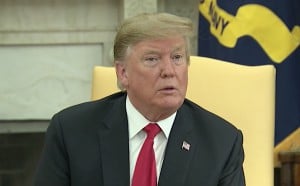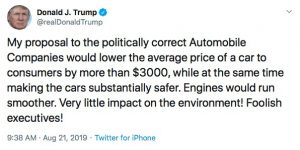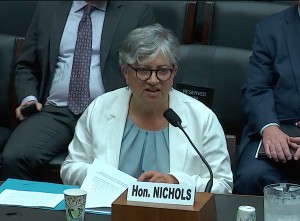
President Donald Trump criticized several automakers for making a deal with California for tougher fuel efficiency standards in July.
The Trump administration was displeased when California reached a deal with four automakers on fuel economy and emissions standards last month tougher than those proposed by the administration.
Not so fast. Another wing of the federal government has now become involved in the process: The Justice Department. The department has announced plans to investigate the four automakers – Ford, BMW, Honda and Volkswagen – that signed the deal, claiming potential antitrust violations.
In a statement to Reuters, Honda said it was cooperating with the Justice Department. The probe is in its early stages, the people said. The other automakers did not immediately comment. The EPA has yet to release its final plan although it says will do so soon.
(Trump Chides Automakers for Making Deal With California)
California’s move usurped a proposal by the Environmental Protection Agency and the National Highway Traffic Safety Administration to keep national standards at current levels, rather than the tougher standards set by the Obama administration.
Part of the as-yet-finalized federal plan, which was sanctioned by President Donald Trump, also calls for revocation of California’s exception to the standards. The carve out allows the state to set its own rules, which are tougher than the federal mandates.
 When California announced its new pact in late July, the EPA was clearly not amused.
When California announced its new pact in late July, the EPA was clearly not amused.
“Today’s announcement from CARB has no impact on EPA’s regulation of greenhouse gas emissions under the Clean Air Act,” Michael Abboud, an EPA spokesman, said in an email to Bloomberg. “This voluntary framework is a PR stunt that does nothing to further the one national standard that will provide certainty and relief for American consumers.”
NHTSA officials added that work continues on a final rule with which all companies must comply. That notion was further supported at the time by the White House’s official statement.
(Four Automakers Sidestep Trump, Make Fuel Economy Deal with CARB)
“The Trump Administration believes strongly in a national fuel standard that promotes safer, cleaner, and more affordable vehicles. The Federal government, not a single state, should set this standard,” White House spokesman Judd Deere told Bloomberg in an emailed statement. “We are moving forward to finalize a rule for the benefit of all Americans.”
Under Trump’s plan, the EPA and NHTSA plan to freeze fuel economy standards indefinitely at the current 37 mpg average for 2020 through 2026.

CARB’s Mary Nichols disputed the Trump administration’s assertion the agency was unwilling to negotiate with federal officials about standards.
The Obama administration set a more aggressive target in 2012 when it pushed for a fleet average goal of 51 mpg by 2026 although that number could be adjusted based on the mix of vehicles an automaker sold.
Under the agreement with California, Ford, Honda, Volkswagen and BMW committed to improve their fleet averages by 3.7% each year, or slightly less than the standards set under the Obama administration.
The deal is important not only because California is the country’s largest automotive market, but also due to the fact that 18 other states use California’s standards for their own mandates. Some of the states have also opposed the Trump administration plan.
(Automakers Push Back on Trump Plans to Relax Mileage Rules)
In fact, shortly after the deal with California, the state of Colorado signed a similar pact with General Motors, Hyundai, Volkswagen and Toyota. The move came about because the multiple states that adhere to California’s guidelines wanted to ensure other automakers would follow suit.
